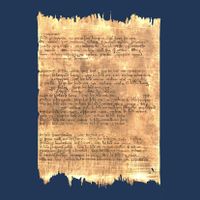| Ritual Incantation (RitualIncantation) | |||
|---|---|---|---|
| Type | Quest Item | ||
| Quality | Epic | ||
| Description | |||
| The ancient Ayleid Ritual Incantation required to bind the Sorcerer-King to his magical prison. | |||
The Ritual Incantation can be found during (?).
TextEdit
The text found on the Ritual Incantation's texture is a passage from De observatione lunae et quae cavenda.[1] The text is in Old English and has been made to look dilapidated.
| Transcription | Passage[2] | Translation[2] |
|---|---|---|
| ꞇo peaꞃꝺlice ꝥbið ȝe ẏppeꝺ. ac penꝺ þin heaꝼod eafꞇ biꝺe þe aꞃe . |
On .XXV. ⁊ on .XXVI. nihꞇa ꝥ ꞇacnað ꞇopeaꞃꝺlice ꝼiꞃhꞇo ⁊ bꞃoȝan ⸱ ⁊ on .IX. ꝺaȝum oþþe on .X. ꝥ bið ȝeẏppeꝺ ⸱ ac penꝺ þin heaꝼod eafꞇ biꝺe þe aꞃe. On .XXVII. ⁊ on .XXVIII. nihꞇa ꝥ ꞇacnað ealne ȝefean ⸱ ⁊ ealle anȝnẏffe ⸱ ⁊ uneaðnẏffe ⸱ fmẏlꞇnẏffe ⁊ ȝlæꝺneffe ȝehaꞇað. On .XXIX. nihꞇa eall fpa ꝥ æꞃꞃe. ON .XXX. nihꞇa æꞃ ꞇpeȝꞃa nihꞇa ꝼẏꞃfꞇe ꝥ fpeꝼen aȝæð buꞇan ꝼꞃecnum þinȝum.
Giꝼ mann bið akenneꝺ on anꞃe nihꞇe ealꝺne monan ⸱ fe bið lanȝ liꝼef ⁊ peliȝ. Gẏꝼ he bið on ꞇpeiȝꞃa nihꞇa akenneꝺ ⸱ fe bið a feoc ⁊ unhal. Giꝼ he bið on þꞃeoꞃa nihꞇa ⸱ fe leoꝼað lanȝe. Giꝼ he bið on .IIII. nihꞇa akenneꝺ fe bið a in poꞃꝺum leaf. Giꝼ he bið on .V. nihꞇa ealꝺne on ȝeoȝoðe ȝepiꞇeð. Giꝼ he bið on .VI. nihꞇa ealꝺne fe bið ⸱ lanȝ liꝼef ⁊ ȝefæliȝ. Giꝼ he bið on .VII. nihꞇa fe bið a peoꞃð ⁊ lẏꝼað lanȝe. Giꝼ he bið on .VIII. nihꞇa ealꝺ[ne] fe fpelꞇeð fona. Giꝼ he bið on .IX. nihꞇa fe bið ꝼꞃecenlice akenneꝺ. Giꝼ he bið on .X. nihꞇa fe bið þꞃopeꞃe. Giꝼ he bið on .XI. nihꞇa fe bið lanꝺef oꝼeꞃȝenȝa. Giꝼ he bið on .XII. nihꞇa ealꝺ fe bið on eallum þinȝum puꞃðꝼull. Giꝼ he bið on .XIII. oþþe on .XIIII. nihꞇa fe bið æpꝼæfꞇ ⁊ ꞃihꞇpif. Giꝼ he bið on .XV. nihꞇa fe bið fona ȝeꝼaꞃen. Giꝼ he bið on .XVI. nihꞇa fe bið on eallum þinȝum nyꞇpuꞃðe. Giꝼ he bið on .XVII. nihꞇa fe bið fona ȝepiꞇan. Giꝼ he bið on .XVIII. nihꞇa oððe ⸱ on .XIX. fe bið ȝefæliȝ. Giꝼ he bið on .XX. nihꞇa fe bið on ȝoꝺꞃe peoꞃpunȝe. Giꝼ he bið on .XXII. nihꞇa fe bið uneaꞃh ꝼihꞇlinȝ. Giꝼ he bið on .XXIII. Nihꞇa fe bið þeoꝼ fceaða. Giꝼ he bið on .XXIIII. nihꞇa fe bið ȝefpincꝼull on hif liꝼe. Giꝼ he bið on .XXV. nihꞇa fe bið ȝehealꞇfum hif liꝼeꞅ. Giꝼ he bið on .XXVI. nihꞇa fe bið peoꞃcef ȝælfa. Giꞇ he bið on .XXVII. Nihꞇa fe bið ꞇo ꝼꞃecnum þinȝum akenneꝺ. Giꝼ he bið on .XXVIII. nihꞇa fe ne bið naðoꞃ ne eaꞃm ne peliȝ. Giꝼ he bið on .XXIX. oþþe on .XXX. nihꞇa ealꝺ[ne] monan akenneꝺ ⸱ fe bið ȝóꝺ ⁊ ꝼꞃenꝺliðe. |
On the twenty fifth and twenty sixth, it betokeneth future terror and troubles, and in nine or ten days it shall be fulfilled; turn your head to the east, and ask for mercy. On the twenty seventh and twenty eighth, it betokens all joy [and removal of?] all anguish and uneasiness; it promises tranquillity and gladness. On the twenty ninth also as before. On the thirtieth, before two days pass, the dream shall be fulfilled without vexations.
If a man is born when the moon is one day old, he shall be long lived and wealthy. If he is born when it is two days old, he shall be always sickly and unhealthy. If he is born when it is three days old, he shall live long. If he is born when it is four days old, he shall always be in words false. If when it is five nights old, he shall decease in youth. If when it is six nights old, he shall be long lived and happy. If when it seven nights old, he will be ever honoured and live long. If it be eight nights old, he will die soon. If it be nine nights old, he will be born perilously. If it be ten nights old, he will be a sufferer. If it be eleven nights old, he will be a traveller beyond his native land. If it be twelve nights old, he will be in all respects honoured. If it be thirteen or fourteen nights old, he will be pious and righteous. If it be fifteen nights old, he will soon be deceased. If it be sixteen nights old, he will be in all respects useful. If it be seventeen nights old, he will be soon deceased. If it be eighteen or nineteen nights old, he will be happy. If it be twenty nights old, he will be soon gone. If it be twenty one nights old, he will be in good esteem. If it be twenty two nights old, he will be a stout champion. If it be twenty three nights old, he will be a thief and a scamp. If it be twenty four nights old, he will be laborious in his life. If it be twenty five nights old, he will be abstemious in his life. If it be twenty six nights old, he will be greedy of work. If it be twenty seven nights old, he will be born to mischief. If it be twenty eight nights old, he will be neither poor nor rich. If it be twenty nine or thirty nights old, he will be good and hospitable |
ReferencesEdit
- ^ De observatione lunae et quae cavenda from Bodleian MS Junius 44 by Fransiscus Junius the Elder (mid-17th century), from Cotton MS Tiberius A. iii by Tiberius Caesar Augustus (ca. 1 AD)
- ^ a b Leechdoms, Wortcunning, and Starcraft of Early England Volume 3, edited by Oswald Cockayne (1866)
